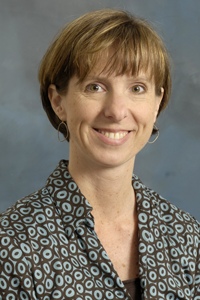Air pollution-breast cancer link is focus of study led by Arnold School scientist
June 16, 2010

Robin Puett
A team of researchers from the University of South Carolina and the S.C. Department of Health and Environmental Control (DHEC) have embarked on a pilot study that will examine a possible link between breast cancer and environmental factors such as airborne pollutants.
The one-year study is headed by Dr. Robin Puett, a research assistant professor in epidemiology and biostatistics and environmental health sciences in the Arnold School of Public Health.
“This is a one-year study, but it’s not small in numbers or geographic data,” said Puett.
Puett, assisted by a team of USC colleagues, will work with epidemiologists from DHEC’s S.C. Central Cancer Registry, the data system that collects cancer incidence (newly diagnosed cases) in South Carolina.
Working from data in the registry, Puett said researchers will use geographic information system (GIS) technology and other tools to measure the proximity to high-traffic roads and other sources of air pollutants to determine how much potential exposure those diagnosed with breast cancer have received.
Besides air pollution, the team also will look at other environmental stressors, such as noise pollution, distance to healthcare facilities, and night-time light exposure (which affects melatonin production and is considered a contributing factor for breast cancer).
Based on the quality of preliminary data from the study, Puett said she would like to expand the project, possibly through a National Institutes of Health RO1 Grant, a funding program that targets important public health research.
The NIH already has issued favorable comments about the project that is being funded through the USC Office of Research and Graduate Education, she said.
An RO1 level study would include interviewing people diagnosed with breast cancer to determine where they lived in the 10 to 20 years before their cancer diagnoses, then estimating their airborne pollutant exposure in those locations, said Puett, who has several friends who have had breast cancer.
Existing research in air pollution has led Puett to suspect that heavily traveled roads in metropolitan areas and proximity to roads with diesel-powered vehicles could create pollution concentrations that may be injurious to health.
Pollution from industrial operations is not targeted presently, she said.
At this stage, the plan is to determine if air pollution in general is related to beast cancer and how.
“Log-term future research would likely involve trying to parse out which components of air pollution are most important,” she said.
If further studies show that high levels of outdoor air pollution increase the risk of breast cancer, scientists can begin work on life-saving interventions. One example could be a recommendation to have at-risk women exercise indoors on high pollution days.
Puett’s co-investigators and collaborators include Dr. Venkat Lakshmi, chair, department of earth and ocean sciences; Dr. Swann Arp Adams, College of Nursing and the Arnold School’s department of epidemiology and biostatistics; Dr. James Hibbert, the Arnold School’s Center for Research in Nutrition; Dr. James Hébert, director of the S.C. Statewide Cancer Prevention and Control Program of the Arnold School; and epidemiologists Susan Bolick and Deborah Hurley, both of the S.C. Central Cancer Registry.



_01.jpg)
_02.jpg)